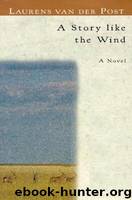A Story Like the Wind by Laurens van der Post

Author:Laurens van der Post
Language: eng
Format: epub
Publisher: For the Benefit of Mr. Kite
Published: 1971-12-31T16:00:00+00:00
Seven
James Archibald Sinclair Monckton, K.C.M. G., D.S.C., B.A. (Cantab.), and daughter
François never cried over Ouwa’s death again. This was not because he had, by the long uncontrolled crying of the night before Mopani’s coming, rid himself of grief. He would go on grieving for the death of Ouwa for ever, he felt, but he had done with tears. This was partly because of the great natural education into the processes of life and death that life in the bush had given him, and partly because of an intimation which would acquire clarity and increasing conviction as time went on, that Ouwa’s death, the causes and the manner of it all, had added a new meaning to life for him.
This new sense of meaning was purely instinctive. Most people, had they been aware of its existence, might well have dismissed it in the reductive manner of this reductive moment in time as sheer, obscure, an over-emotional reaction and not the reasoned sublimation of cause and effect that those responsible for his upbringing should have made it. None the less, to some extent consciously but, of course, in far greater measure unconsciously, François was about to begin to realize how much Ouwa’s fatal decline and loss of will to live had been a byproduct of the widespread rejection by the European world (to which he himself ostensibly belonged), of the natural man of Africa and his values. This rejection as far as Ouwa was concerned was summed up aptly for him in uLangalibalela’s phrase, ‘the turning of the backs’.
This ‘turning of the backs’ on Ouwa by his own people seemed to François not merely cruel and unimaginative, but so deliberate and sustained a cause of his father’s decline and death that François felt he had died not from natural causes so much as from an act of calculated murder. More disturbing, more subtle and more profound still was the first glimmering of a belief that, without knowing it, Lammie and Ouwa themselves had been caught unawares in some of this mechanism of rejection of the natural man in Africa, despite all the great love they had devoted to him and his welfare.
François experienced this aspect of Ouwa’s and Lammie’s lives, of course, only in its effects on his own, and in no sense ideologically. The jargon of our time would have called it a form of over-compensation for their unawareness of some vital element in themselves. And one is forced to admit that their concern for educating the natural man of Africa was most unusual. It would not have been possible to maintain this against their people and the trend of a whole age in Africa, had it not possessed so powerful a compulsive character. Reviewed under the microscope of tragedy this concern appears not to have prevented them from presupposing a kind of universality and absolutism in European values of education, which implied that the natural children of Africa themselves had little of value to contribute. One suspects, therefore, that François
Download
This site does not store any files on its server. We only index and link to content provided by other sites. Please contact the content providers to delete copyright contents if any and email us, we'll remove relevant links or contents immediately.
| General | Cape Town |
| Johannesburg |
1610396766 (N) by Jo Ann Jenkins(1298)
Whatever You Do, Don't Run by Peter Allison(1248)
Botswana--Culture Smart! by Michael Main(1239)
In Arabian Nights by Tahir Shah(1203)
The Old Farmer's Almanac 2020 by Old Farmer’s Almanac(1157)
Livingstone by Tim Jeal(1154)
Ubuntu by Ellis Heather;(1138)
The Templars by Michael Haag(1126)
Dead Eye by Mark Greaney(1111)
Africa: Altered States, Ordinary Miracles by Richard Dowden(1080)
Top 10 Israel and Petra by DK Travel(1073)
Morocco Travel Guide by Lonely Planet(1067)
Egypt Travel Guide by Lonely Planet(1057)
The Promise of a Pencil: How an Ordinary Person Can Create Extraordinary Change by Braun Adam(1055)
False Papers by André Aciman(1053)
First Comes Love, then Comes Malaria by Eve Brown-Waite(1042)
Jeff Corwin by Jeff Corwin(1031)
The Masked Rider by Neil Peart(991)
African Nights by Kuki Gallmann(968)
